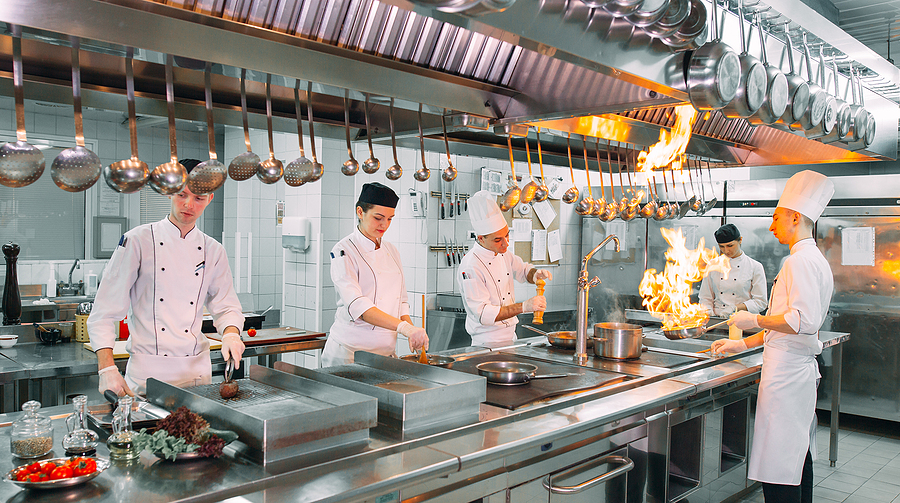Chances are if you operate a New Mexico restaurant, you’d be more than keen to keep your New Mexico business safe, because there are several risks inherent in your business, including fire.
Here are some best practices to ensuring you can keep your New Mexico business safe.
Prevention
Install an automatic fire suppression system – One of the best steps you can take is to install an automatic fire suppression system in the kitchen and ensure you have it professionally inspected on a 6 monthly basis. These fire suppression systems automatically disperse chemicals that control flames; however, you can switch the system off manually. The fuel or electricity is completely disconnected from the cooking equipment upon activation as an added precaution.
There are different types of fire extinguishers for different purposes, and the extinguisher for a commercial kitchen is a Class K extinguisher.
This Class K extinguisher is used on fires caused by grease or other substances that burn at high temperatures. Use this extinguisher after the built-in hood suppression system has been activated.
Be sure to also keep Class ABC extinguishers on hand too for use on other types of fires such as electrical, paper or wood.
Install fire alarms – Fire alarms help to make detection of fires easier, but it should be noted that it’s important to have your fire alarms regularly tested and maintained.
Have a working sprinkler system – A working sprinkler system is ideal to suppress a fire and preventing it from spreading, however the emphasis is on “working”. Your sprinkler system should be regularly tested and well-maintained.
Maintenance
It’s important to regularly inspect your exhaust system for grease build-up. Monthly inspections should be maintained for exhaust systems that use charcoal or wood for cooking. Busy restaurants should undertake inspections quarterly, and moderate volume operations should conduct semi-annual inspections.
Equipment that hasn’t been properly maintained, or is older, can be susceptible to gas leaks. A leak is usually detected by smell, but you can also tell with a change in your flame to a flickering yellow or orange, instead of a steady blue flame. A leak could also be indicated if the pilot light goes out in gas stoves or ovens.
Fire departments or local code enforcement officials conduct annual public inspection to ensure compliance with safety procedures. For example, exit signs, maximum occupancy and seating arrangements are checked to ensure standards and regulations are followed.
If you wish to use real candles in your restaurant, you will require an open flame permit. Further, any fabric materials including curtains, draperies, chairs, and other seating must be fire retardant.
There is also a very real risk of electrical wires caused by unsafe wiring or by sockets plugs or other electrical parts becoming overheated. Modern appliances used in an older building, for example, may be a recipe for disaster as the outdated wiring may not be able to handle the increased voltage used in modern appliances. Keep an eye out for worn cords or wiring, broken switch plates and combustible materials near power sources. It’s also important to schedule regular maintenance for your electrical equipment.
Cooking System Cleanings
Your kitchen oven hood needs to be adequately cleaned and maintained because these pose a substantial fire risk. Nightly cleaning, together with a regular more thorough cleaning, should be set up on a regular schedule.
The kitchen’s ductwork and exhaust system create a risk because these are the vents and fans behind ovens and stoves that extract smoke and flammable vapors. They are notoriously susceptible to grease build-up, so it’s vital that these are cleaned regularly. Make sure the exhaust hoods are kept clean as the grease build-up restricts air flow, rendering them ineffective. Clean grease from walls, work surfaces and equipment such as vents, filters, grills, and ranges.
Ensure wood and charcoal burning ovens have the ashes removed on a daily basis. Store the ashes outside in metal bins that are at least 10 feet away from flammable materials and buildings.
Clean facilities help to prevent fires. Ensure staff are storing paper products, cardboard boxes, fabric materials and food correctly, and away from heat and cooking equipment. Remove the trash, dirty rags, and flammable materials daily.
Ensure cigarettes are extinguished completely before disposing in an appropriate receptacle, and never allow smoking in or near storage areas.
Staff Training
Complete, hands-on training with your employees is critical. Because they are likely to be “Johnny on the spot”, they need to know exactly what to do in case of fire. This includes the proper use and location of equipment such as fire extinguishers and safe evacuation. Training should be available from your local fire department.
Finally
Main power may be lost during a fire, so it’s important to check exit and emergency lighting. Regular testing will ensure your exit and emergency lighting is operational – including any backup systems you have – to allow your patrons and staff to safely exit the premises in the event of fire.
